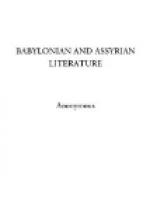Mine eyes beheld thy fallen
gates,
Thy blood warm flowing in
thy streets,
My
heart was broken then.
I raised mine eyes and saw
thy Sar
In glory on his steed of war,
And
joy returned again!
I saw the foe in wild dismay
Before him flee that glorious
day.
With
joy I heard the cry
Of victory resound afar,
Saw Elam crushed ’neath
Accad’s car:
I
shouted, Victory!
Away! till birds of prey shall
rend
His flesh and haughty Elam
bend
Before
our mighty Sar!
Beneath his forest of pine-trees
The battle-cry then loudly
raise,
We
follow Izdubar!
And may the birds of prey
surround
Khumbaba stretched upon the
ground,
Destroy
his body there!
And Izdubar alone be king,
And all his people joyful
sing,
With
glory crown him here!
All hail! All hail! our
giant King,
The amaranti[6] for
him bring,
To
crown him, crown him here,
As King of Accad and Sutu,
And all the land of Subar-tu!
So
sayeth Hea’s seer!”
The counsellors and chieftains wildly cry
Around the throne, “All hail izzu sar-ri
Of Su-bar-tu!” and shouting leave the halls
To summon Accad’s soldiers from the walls
To hear the war proclaimed against their foes,
And Accad’s war-cry from them loud arose.
King Izdubar Heabani warmly prest
Within his arms upon his throbbing breast,
And said, “Let us to the war temple go,
That all the gods their favor may bestow.”
The seer replied, “Tis well! then let us wend
Our way, and at the altar we will bend,—
To Ishtar’s temple, where our goddess queen
Doth reign, seek her propitious favor, then
In Samas’ holy temple pray for aid
To crush our foe;—with glory on each blade,
Our hands will carry victory in war.”
The chiefs, without the temple, join their Sar.
[Footnote 1: “Rab-sak-i,” chief of the high ones, chief of the seers and counsellors; prime minister.]
[Footnote 2: “Twenty kaspu,” 140 miles; each kaspu was seven miles, or two hours’ journey.]
[Footnote 3: “Six gars,” 120 feet; each gar was a twenty-foot measure. Khumbaba’s walls were thus 120 feet high and forty feet thick—much like the walls of Babylon.]
[Footnote 4: “Nipur” was one of the cities of Izdubar’s kingdom, from whence he came to the rescue of Erech.]
[Footnote 5: “Man-u-ban-i,” a tree or shrub of unpleasant odor mentioned by Heabani. See Sayce’s revised edition Smith’s “Chald. Acc. of Genesis,” p. 254. The fragment translated by Mr. Sayce should be placed in another position in the epic.]
[Footnote 6: “Amaranti,” amaranth. “Immortal amaranth.”—“Par. Lost.”]




